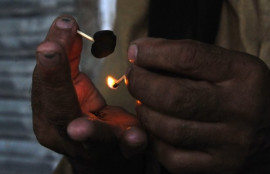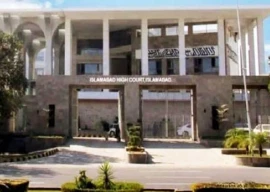
Teachers’ reluctance to go beyond numeracy and literacy goals in the classroom tends to choke critical thinking among students, Hugh McLean, director of the Open Society Education Support Programme, said on Thursday.
He was speaking at a panel discussion on critical thinking in education at the Teachers’ Literature Festival. The discussion was held in Manto Ki Gali, one of the several venues at the Children’s Library Complex, where parallel sessions were held throughout the day
Teachers and education experts discussed several ways of nurturing critical thinking such as teaching students under the open sky, offering multi-lingual lessons to encourage greater communication and making the classroom “student-centric”.
“But we haven’t even been able to meet our numeracy and literacy goals,” Simorgh Women’s Research and Publication Centre Executive Coordinator Neelam Hussain said. “School systems here are a scandal.”
She spoke of how rote-learning was preferred in most classrooms, “even in schools charging high fees”.
Hussain encouraged teachers to use languages their students were comfortable with. “Teaching in a language other than the child’s mother tongue halts the process of his or her development and critical thinking.”
Ian Macpherson, deputy director of the Open Society Education Support Programme, stressed the need to find energising and inspiring ways to teach in the classroom. Children who engage in critical thinking inside the classroom are also active in terms of political participation and social engagement, he said.
“Education in Pakistan needs to rewritten,” Idara-i-Taleem -o-Aagahi Programmes Director Baela Raza Jamil said while moderating the session. For that, teachers required empirical evidence and examples of ways children benefited from methodologies to incorporate critical thinking in classrooms.
Dr Rafia Ali, a physicist and educator, said connection and sharing lay at the heart of the learning process. “It is essential for children to know that it is okay to make mistakes and to discuss and share their views and opinions inside the classroom.”
Society for Advancement of Education chairman Abbas Rashid stressed the need to reform the examination system so that it did not focus solely on the exact reproduction of textbooks. “This limits the knowledge pool of students and makes it hard to promote critical thinking.”
To Harappa and Back
Sheherezade Alam tells her students to connect with the basic elements: earth, water, fire and air. “If you fail to connect with the earth, whatever you learn will lack roots. You will simply float on a sea of vague information.”
She was speaking at the session: I belong to Harrapa and Harappa Belongs to Me. Alam was accompanied by Muhammad Bashir, a potter from Harappa, who crafted replicas of ancient clay pots and seals recovered from the Indus Valley. Bashir told participants how to knead clay to make pottery and how to make small kilns at home.
“We don’t know ourselves,” said Alam said. “We have lost all connection with our 5,000 year-old history.”
She spoke of how the Indus Valley was ahead of its time in terms of civil engineering, how it had a proper drainage and sanitation system. She discussed the dresses women there wore and the progressive society of that time. “The valley was so peaceful that there were no wars there for around 2,000 years.”
Alam stressed the need to reconnect with the Indus Valley. “We have Harappa on earth… we belong to it and it belongs to us.”
Alam showed the audience a book on Harappa illustrated by Jonathan Mark Kenoyer. She said Kenoyer had worked on the Harappa Civilisation for 30 years. “He literally gave us Harappa as we know it.” She said there were some great books available at some book stores for children that teachers did not know about. Alam spoke of her love for the Peepal tree and said that she taught children it was the Tree of Life. At another session, Symbolism of Heer, Raza Kazim and Syed Waseem discussed the use of symbolism in the poetry of Waris Shah. They discussed the relevance of the character in the 21st century.
About the character, Kazim said the most distinguishing feature of Heer was that she was firm about never giving up her human avatar for Kheras. Waseem said it sent the powerful message that a person must not let his self be tarnished at any cost.
To a question referring to disentanglement with culture, Kazim said it wasn’t as if people were disconnected from their culture, they were in effect separated from their souls. He said Waris Shah’s poetry was a powerhouse for spiritual connection to our cultural roots.
Published in The Express Tribune, November 28th, 2014.







































COMMENTS
Comments are moderated and generally will be posted if they are on-topic and not abusive.
For more information, please see our Comments FAQ